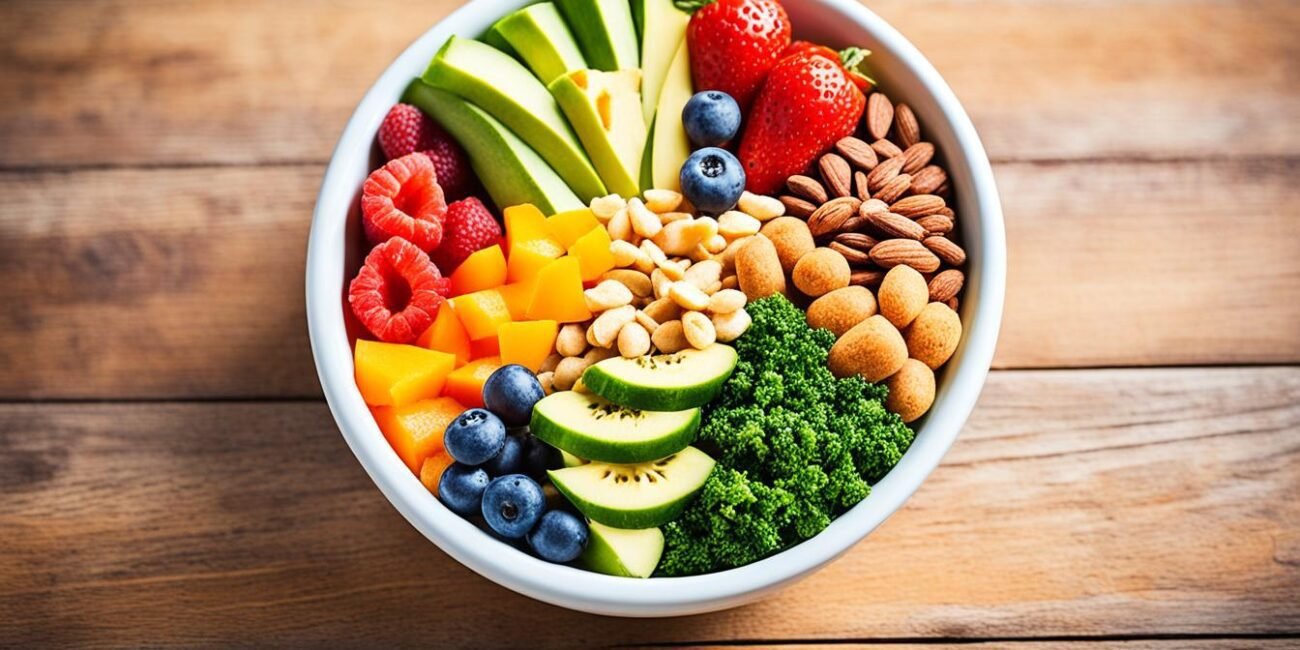Add Healthy Foods to Your Pet’s Bowl Now!
Are you giving your pet the best nutrition possible? Many pet owners solely rely on dry commercial pet food to nourish their furry friends. But is that enough to ensure their optimal health and well-being? What if I told you that adding healthy foods to your pet’s bowl can greatly enhance their nutrition and overall wellness? It’s time to challenge the common belief and explore the benefits of incorporating nutrient-rich options into your pet’s diet.
When it comes to pet nutrition, we often overlook the importance of a varied and holistic diet. Just like humans, pets can benefit from a natural and diverse meal plan that includes a range of healthy ingredients. By diversifying your pet’s diet, you can provide them with essential vitamins, minerals, antioxidants, and other beneficial nutrients that commercial pet food may lack.
From kefir to pumpkin puree, bone broth to fresh fruits and vegetables, there are numerous nutritious options you can consider incorporating into your pet’s diet. But why should you add these healthy foods? And how can they contribute to your pet’s overall health and vitality? Let’s dive into the details and discover the incredible benefits that these additions can bring to your pet’s bowl.
Key Takeaways:
- Adding healthy foods to your pet’s bowl can enhance their nutrition and overall wellness.
- Consult with your veterinarian and groomer to determine the best additions for your pet’s specific needs.
- Incorporating kefir, pumpkin puree, bone broth, and fresh fruits and vegetables can provide your pet with essential vitamins, minerals, antioxidants, and other beneficial nutrients.
- Introduce new foods slowly and in moderation to prevent any digestive upset.
- By diversifying your pet’s diet, you can provide them with a balanced and wholesome meal plan that supports their optimal health and vitality.
The Benefits of Kefir for Your Pet’s Health
Kefir, a fermented food resembling yogurt, is a powerhouse of probiotics and beneficial yeasts. Incorporating kefir into your pet’s diet can have a positive impact on their health and well-being. It is particularly effective in preventing yeast overgrowth and combating harmful bacteria, making it an excellent choice for pets with smelly, itchy skin, fur loss, or frequent ear infections.
Probiotics are live microorganisms that promote a healthy gut environment. They support digestion, boost the immune system, and help maintain a balance of beneficial bacteria in the gut. Kefir is teeming with these friendly bacteria, which can enhance pet nutrition and overall vitality.
When introducing kefir to your pet, it’s essential to start slowly and in small amounts. Gradual introduction allows the digestive system to adjust and reduces the risk of digestive upset.
The Power of Probiotics
Kefir’s probiotics work wonders in promoting a robust immune system, aiding in nutrient absorption, and maintaining a healthy digestive tract. They can also help prevent and manage conditions such as yeast overgrowth, diarrhea, and intestinal inflammation.
“Probiotics found in kefir can help your pet’s gut flourish with beneficial bacteria, improving their overall health and vitality.” – Jane Adams, DVM
Supporting Skin and Coat Health
Pets suffering from skin allergies, itchiness, or inflammation can benefit from kefir’s anti-inflammatory properties. The probiotics and yeasts in kefir can help alleviate skin issues by reducing inflammation and promoting a healthy balance of microorganisms on the skin.
Kefir’s beneficial bacteria also aid in improving coat health by reducing excessive shedding, strengthening hair follicles, and giving the coat a healthy sheen. Regular consumption of kefir can result in a noticeably softer and shinier coat for your pet.
Preventing Digestive Issues
The addition of kefir to your pet’s diet can help prevent and manage digestive issues such as diarrhea and constipation. The probiotics in kefir promote a healthy gut flora, aiding in digestion and nutrient absorption.
Furthermore, kefir’s probiotics can help maintain a balanced pH in the digestive tract, reducing the risk of fungal infections, including candida overgrowth. By supporting a healthy gut environment, kefir contributes to optimal digestive function and overall wellness in pets.
Choosing the Right Kefir
When selecting kefir for your pet, opt for plain, unsweetened varieties without any artificial additives or sweeteners. It’s best to choose kefir made from organic, whole milk or goat’s milk to ensure the highest quality and nutritional value.
| Benefit | How Kefir Helps |
|---|---|
| Preventing yeast overgrowth | The probiotics and beneficial yeasts in kefir create an unfavorable environment for bad yeast, preventing overgrowth. |
| Improving skin and coat health | Kefir’s anti-inflammatory properties and beneficial bacteria can help alleviate skin allergies and promote a healthy, shiny coat. |
| Aiding digestion | The probiotics in kefir support a healthy gut flora, aiding in digestion and nutrient absorption while reducing the risk of digestive issues. |
Adding kefir to your pet’s diet is a simple and effective way to boost their health. However, as with any dietary changes, consult with your veterinarian to ensure it is suitable for your pet’s specific needs. With the benefits of kefir, you can provide your pet with a nutritional edge and support their overall well-being.
The Power of Pumpkin Puree for Digestion
Pumpkin puree is not only a delicious addition to your pet’s diet but also offers numerous benefits for digestion. Its high soluble fiber content makes it a popular food supplement, helping to regulate your pet’s digestion and promote a healthy digestive system.
Soluble fiber plays a crucial role in digestion as it absorbs water, softening the stool and promoting regular bowel movements. For pets struggling with constipation, adding pumpkin puree to their food bowl can help bulk up the stool and ease bowel movements. On the other hand, for pets dealing with diarrhea, pumpkin puree can help firm up the stool and alleviate digestive issues.
In addition to its soluble fiber content, pumpkin puree is also rich in essential vitamins, minerals, and antioxidants. These nutrients, including vitamins A, C, and E, as well as potassium and manganese, support overall health and well-being in your pet. The antioxidants present in pumpkin puree can help combat free radicals, promoting a strong immune system and reducing the risk of chronic diseases.
When incorporating pumpkin puree into your pet’s diet, it’s essential to use plain, canned pumpkin puree without any additives or spices. Aim to add a small amount of pumpkin puree to your pet’s food bowl, gradually increasing the quantity based on your pet’s individual needs.
Benefits of Pumpkin Puree for Digestion:
- Regulates digestion
- Provides soluble fiber
- Promotes regular bowel movements
- Helps with constipation and diarrhea
- Rich in vitamins and minerals
- Antioxidant properties
- Supports a healthy immune system
By adding a small amount of pumpkin puree to your pet’s food bowl, you can support their digestion and overall health. Remember to consult with your veterinarian to ensure pumpkin puree is suitable for your pet and to determine the appropriate amount to add to their diet.
Enhancing Hydration and Joint Health with Bone Broth
Incorporating bone broth into your pet’s meals can be a game-changer for their overall well-being. Not only does bone broth provide hydration, which is especially beneficial for pets who eat dry or dehydrated kibble, but it also offers a myriad of other health benefits.
One of the key advantages of bone broth is its ability to support joint health. The natural collagen and gelatin found in bone broth help to lubricate joints and promote flexibility, potentially alleviating discomfort associated with conditions such as arthritis. By including bone broth in your pet’s diet, you can help them maintain an active and agile lifestyle.
Bone broth also aids in digestion. The amino acids and gelatin in bone broth help soothe and heal the gut lining, improving nutrient absorption and reducing gastrointestinal issues such as inflammation and leaky gut syndrome. This can be particularly beneficial for pets with sensitive stomachs or digestive disorders.
Furthermore, bone broth acts as a natural detoxifier by supporting liver function. It contains glycine and glutathione, two powerful antioxidants that assist in the detoxification process and help eliminate toxins from the body. By incorporating bone broth into your pet’s diet, you can promote their overall detoxification and well-being.
To demonstrate the nutritional composition of bone broth, here is a breakdown of its key components:
| Nutrient | Amount per Cup (240ml) |
|---|---|
| Protein | 6g |
| Calcium | 41mg |
| Phosphorus | 50mg |
| Magnesium | 9mg |
| Potassium | 177mg |
As you can see, bone broth is not only hydrating and beneficial for joint health, digestion, and detoxification but also provides essential nutrients that contribute to your pet’s overall nutrition.
Including bone broth in your pet’s meal plan is an easy and delicious way to enhance their diet. You can either make homemade bone broth using bones from poultry, beef, or fish, or opt for store-bought options that are available in many pet supply stores. Whichever route you choose, make sure to select bone broth that is free from added seasonings, onions, or garlic, as these ingredients can be harmful to pets.
Your pet’s well-being is our utmost priority, and incorporating bone broth into their diet can be a simple yet significant step towards supporting their hydration, joint health, digestion, and detoxification. Give it a try and see the difference it makes in your pet’s overall vitality!
The Importance of Fresh Fruits and Vegetables for Your Pet
Fresh fruits and vegetables are a vital component of a healthy pet’s diet. They not only provide a wide array of essential nutrients but also offer cancer-fighting properties that can help keep your furry friend in optimal health. However, to ensure maximum nutrient absorption, it is recommended to pulverize or puree these fresh fruits and vegetables before serving them to your pet.
When it comes to incorporating fresh fruits into your pet’s diet, some great options include:
- Blueberries: Packed with antioxidants, blueberries can help combat free radicals and support your pet’s immune system.
- Apples: Rich in vitamins A and C, apples can promote healthy skin and coat in your pet.
- Carrots: These crunchy veggies are not only high in fiber but also provide a natural source of beta-carotene, promoting good eye health.
- Bananas: A great source of potassium and vitamin B6, bananas can help maintain a healthy heart and proper brain function in your pet.
- Cantaloupe: This juicy fruit is packed with vitamins A and C, promoting overall immunity and healthy skin for your pet.
- Broccoli: Offering a rich combination of vitamins and minerals, broccoli is a superfood for pets, supporting their overall health and well-being.
Additionally, incorporating fresh vegetables into your pet’s diet can provide a range of beneficial nutrients. Remember to puree or pulverize these vegetables to ensure they are easily digestible.
Examples of fresh vegetables suitable for your pet include:
- Spinach: This leafy green is a powerhouse of vitamins and minerals, including iron, which supports your pet’s energy levels.
- Kale: Packed with antioxidants and essential nutrients, kale provides immune system support and can help reduce inflammation in your pet.
- Cucumbers: Hydrating and low in calories, cucumbers offer a refreshing treat for your pet while promoting good hydration.
- Zucchini: With a high water content and rich in vitamins A and C, zucchini aids in digestion and supports your pet’s overall health.
By incorporating these fresh fruits and vegetables into your pet’s diet, you provide them with a wide range of beneficial nutrients and cancer-fighting properties. Always consult with your veterinarian to ensure the fruits and vegetables you choose are suitable for your pet’s specific needs and consider any dietary restrictions they may have.
Remember, a balanced and wholesome diet is key to maintaining your pet’s optimal health and vitality.
The Nutritional Power of Green Leafy Vegetables
When it comes to boosting your pet’s health, don’t underestimate the nutritional power of green leafy vegetables. Spinach, kale, watercress, and broccoli are just a few examples of these nutrient-dense greens that can provide numerous benefits.
Green leafy vegetables are packed with essential vitamins, including vitamin A, vitamin C, and vitamin K. These vitamins play a vital role in supporting your pet’s overall well-being, from maintaining healthy eyesight to promoting proper blood clotting.
In addition to vitamins, green leafy vegetables are rich in carotenoids, which are powerful antioxidants. Antioxidants help protect against free radicals, which can cause damage to cells and contribute to various health issues. By incorporating green leafy vegetables into your pet’s diet, you can help support their immune system and reduce the risk of chronic diseases.
Another key nutrient found in green leafy vegetables is folate. Folate is crucial for cell division and DNA synthesis, making it essential for your pet’s growth and development. Furthermore, studies have shown that folate can affect mood and behavior, playing a role in maintaining a balanced and happy disposition in pets.
Green leafy vegetables are a powerhouse of nutrients that can greatly benefit your pet’s health. From providing essential vitamins to boosting their immune system, these greens should be a staple in their diet.
When adding green leafy vegetables to your pet’s meals, it’s important to prepare them appropriately. Ensure that the vegetables are thoroughly washed and free from any pesticides or harmful chemicals. Additionally, consider steaming or lightly cooking the greens to help improve digestibility and nutrient absorption.
The Benefits of Green Leafy Vegetables:
- Rich source of vitamins A, C, and K
- Packed with carotenoids, powerful antioxidants
- Supports a healthy immune system
- Contains folate, which affects mood and behavior
Introducing green leafy vegetables gradually and in appropriate portions is essential, especially if your pet is not accustomed to these foods. Consulting with your veterinarian can provide valuable guidance on the right amount and frequency of green leafy vegetables for your pet’s specific needs.
Incorporating green leafy vegetables into your pet’s diet can have a significant impact on their overall health and well-being. So why wait? Start adding these nutrient-packed greens to their bowl and watch your pet thrive!
The Benefits of Mushrooms for Your Pet’s Health
Mushrooms offer a wide range of benefits for your pet’s health. They are not only a tasty addition to their meals but also provide numerous advantages that contribute to their overall well-being. Incorporating mushrooms into your pet’s diet can promote disease prevention, boost the regeneration of damaged cells, and support their immune system. Additionally, mushrooms possess anti-inflammatory properties that can help alleviate inflammation in the body.
These incredible benefits are attributed to the bioactive compounds found in mushrooms, which include polysaccharides, proteins, fats, vitamins, and minerals. These compounds work synergistically to enhance your pet’s health and vitality.
Some mushroom varieties, such as reishi and cordyceps, have specific properties that make them even more beneficial for your pet. Reishi mushrooms, known as “the mushroom of immortality,” have immunomodulating properties, meaning they can assist in regulating and strengthening your pet’s immune system. On the other hand, cordyceps mushrooms have anti-inflammatory properties that can help reduce inflammation-related conditions in your pet.
Incorporating mushrooms into your pet’s diet is simple and can be done in various ways. You can add sliced mushrooms to their meals, prepare mushroom broth, or even use mushroom supplements designed for pets. It’s important to consult with your veterinarian before introducing mushrooms to your pet’s diet to ensure they are suitable for their specific health needs.
Benefits of Mushrooms for Your Pet’s Health:
- Disease prevention
- Regeneration of damaged cells
- Immune system support
- Anti-inflammatory properties
By making mushrooms a part of your pet’s diet, you can provide them with a natural and nutritious way to support their overall health and well-being.
Harnessing the Nutritional Power of Eggs for Your Pet
Eggs are a nutrient-dense food that provides a range of essential nutrients for your pet’s health. They are packed with amino acids, vitamins, and minerals, making them a valuable addition to your pet’s diet.
Eggs are known for their anti-microbial properties, helping to protect your pet against harmful bacteria and microorganisms. The high-quality protein found in eggs supports muscle development and maintenance, ensuring your pet stays strong and healthy.
The Benefits of Eggs for Your Pet:
- Eggs are rich in amino acids, which are the building blocks of proteins. These amino acids are essential for your pet’s overall growth and development.
- The vitamins found in eggs, such as vitamin A, vitamin D, and B vitamins, contribute to your pet’s overall wellbeing. These vitamins support healthy skin, a shiny coat, strong bones, and a robust immune system.
- The minerals present in eggs, including iron, selenium, and zinc, help support various bodily functions. Iron aids in oxygen transportation, selenium acts as an antioxidant, and zinc promotes healthy cell growth and repair.
- The anti-microbial properties of eggs can help keep your pet’s digestive system healthy and protect against harmful bacteria.
Adding eggs to your pet’s diet can provide essential nutrients and contribute to their overall health and vitality.” – Veterinarian Dr. Emily Thompson
You can feed your pet raw or lightly cooked eggs to ensure they receive the full benefits. However, it’s essential to avoid adding any seasonings or additives that may be harmful to your pet. Keep in mind that individual pets may have specific dietary needs or restrictions, so consult with your veterinarian to determine the appropriate amount of eggs to include in their diet.
Furthermore, you can also incorporate eggshells into your pet’s nutrition routine for an additional calcium boost. Ground eggshells can be mixed with their food, providing a natural source of calcium to support strong bones and teeth.
Remember, moderation is key when introducing new foods to your pet’s diet. Start by offering small amounts of eggs and monitor their response. If you notice any digestive issues or allergies, discontinue feeding eggs and consult with your veterinarian for further guidance.
The Antioxidant Benefits of Berries for Your Pet
Berries are not only delicious but also provide numerous health benefits for your pet. These small, colorful fruits are packed with antioxidants, including anthocyanins and catechins, which play a vital role in promoting your pet’s well-being.
Antioxidants help reduce oxidative stress, which is caused by an imbalance between harmful free radicals and the body’s ability to neutralize them. By incorporating berries such as blackberries, strawberries, blueberries, raspberries, and cranberries into your pet’s diet, you can enhance their antioxidant defense system and support overall health.
Beyond their antioxidant properties, berries also offer antimicrobial benefits. The natural compounds found in berries help combat harmful bacteria and protect against infections, improving your pet’s immune system response.
To highlight the incredible benefits of berries for your pet, here is a table comparing the antioxidant properties of different types of berries:
| Berry Type | Antioxidant Content |
|---|---|
| Blackberries | High |
| Strawberries | Moderate |
| Blueberries | High |
| Raspberries | Moderate |
| Cranberries | High |
As you can see, blackberries, blueberries, and cranberries stand out for their exceptional antioxidant content. Including a variety of these nutritious berries in your pet’s diet can help protect against oxidative stress, inflammation, and age-related diseases.
Remember, when introducing berries into your pet’s diet, start slowly and in small amounts. Monitor their response and consult with your veterinarian if you have any concerns. Enjoy the benefits of berries and watch your pet thrive!
Conclusion
Adding these healthy foods to your pet’s bowl can significantly enhance their nutrition and overall wellness.
Introducing new foods slowly and in moderation is essential to prevent any digestive upset. Therefore, consulting with your veterinarian and groomer is crucial as they can provide valuable insights and ensure you’re making the best choices for your pet’s specific needs.
It’s also important to observe your pet’s weight and make adjustments to their regular food intake to accommodate the additional calories from the healthy food additions. By incorporating these nutritious options into their diet, you can provide your pet with a balanced and wholesome meal plan that supports their optimal health and vitality.
FAQ
Why should I add healthy foods to my pet’s bowl?
Adding healthy foods to your pet’s bowl can greatly enhance their overall wellness and nutrition. It can provide them with essential vitamins, minerals, antioxidants, and other beneficial nutrients that may be lacking in their regular diet.
How do I know which healthy foods are suitable for my pet?
It’s important to consult with your veterinarian and groomer about the best additions for your pet’s specific needs. They can provide valuable insights and ensure you are making the best choices that align with your pet’s health condition, age, and breed.
How should I introduce new healthy foods to my pet’s diet?
It’s important to introduce new foods slowly and in small amounts to prevent any digestive upset. Start by adding a small portion of the healthy food to your pet’s regular meal and gradually increase the quantity over time.
Can I feed my pet raw eggs?
Feeding your pet raw or lightly cooked eggs is generally safe and can provide them with high-quality protein and essential nutrients. However, it’s important to consult with your veterinarian to ensure it is suitable for your pet and to address any concerns about bacteria or other health risks.
Are all mushrooms safe for pets?
Not all mushrooms are safe for pets. Some varieties can be toxic and pose a risk to their health. It’s important to consult with your veterinarian to determine which mushrooms are safe and suitable for your pet’s consumption.
How much pumpkin puree should I add to my pet’s diet?
The amount of pumpkin puree to add to your pet’s diet depends on their size, weight, and specific needs. It is best to start with a small amount, such as a teaspoon, and gradually increase the quantity if needed. Consulting with your veterinarian can provide guidance on the appropriate serving size for your pet.
Can I give my pet fresh fruits and vegetables as treats?
Yes, fresh fruits and vegetables can be a healthy and tasty treat for your pet. However, it’s important to ensure that the fruits and vegetables are safe for your pet to consume and that they are prepared in a way that they can be easily digested and absorbed. Consulting with your veterinarian can provide guidance on pet-friendly fruits and vegetables and the best ways to prepare them.










No Comment! Be the first one.